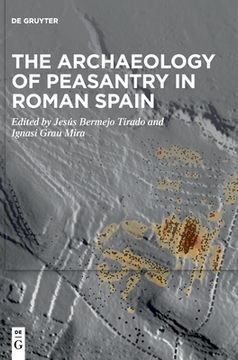Compartir
The Archaeology of Peasantry in Roman Spain (en Inglés)
No Contributor (Autor)
·
de Gruyter
· Tapa Dura
The Archaeology of Peasantry in Roman Spain (en Inglés) - No Contributor
Elige la lista en la que quieres agregar tu producto o crea una nueva lista
✓ Producto agregado correctamente a la lista de deseos.
Ir a Mis ListasSe enviará desde nuestra bodega entre el
Jueves 23 de Mayo y el
Viernes 24 de Mayo.
Lo recibirás en cualquier lugar de Estados Unidos entre 1 y 3 días hábiles luego del envío.
Reseña del libro "The Archaeology of Peasantry in Roman Spain (en Inglés)"
This volume aims to present an updated portrait of the Roman countryside in Roman Spain by the comparison of different theoretical orientations and methodological strategies including the discussion of textual and iconographic sources and the analysis of the faunal remains. The archaeology of rural areas of the Roman world has traditionally been focused on the study of villae, both as an architectural model of Roman otium and as the central core of an economic system based on the extensive agricultural exploitation of latifundia. The assimilation of most rural settlements in provincial areas of the Roman Empire with the villa model implies the acceptance of specific ideas, such as the generalization of the slave mode of production, the rupture of the productive capacity of Late Iron Age communities, or the reduction in importance of free peasant labor in the Roman economy of most rural areas. However, in recent decades, as a consequence of the generalized extension of preventive or emergency archaeology and survey projects in most areas of the ancient territories of the Roman Empire, this traditional conception of the Roman countryside articulated around monumental villae is undergoing a thorough revision. New research projects are changing our current perception of the countryside of most parts of the Roman provincial world by assessing the importance of different types of rural settlements. In the last years, we have witnessed the publication of archaeological reports on the excavation of thousands of small rural sites, farms, farmsteads, enclosures, rural agglomerations of diverse nature, etc. One of the main consequences of all this research activity is a vigorous discussion of the paradigm of the slave mode of production as the basis of Roman rural economies in many provincial areas. A similar change in the paradigm is taking place, with some delay, in the archaeology of Roman Spain. After decades of preventive/emergency interventions there is a considerable quantity of unpublished data on this kind of rural settlements. However, unlike the cases of Roman Britain or Gallia Comata, no synthesis or national projects are undertaking the task of systematizing all these data. With the intention of addressing this current situation the present volume discusses the results and methodological strategies of different projects studying peasant settlements in several regions of Roman Spain.
- 0% (0)
- 0% (0)
- 0% (0)
- 0% (0)
- 0% (0)
Todos los libros de nuestro catálogo son Originales.
El libro está escrito en Inglés.
La encuadernación de esta edición es Tapa Dura.
✓ Producto agregado correctamente al carro, Ir a Pagar.

